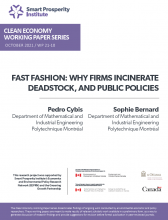By Pedro Cybis and Sophie Bernard
Fast fashion increases the overall consumption and need for new products each season. With trends rapidly fading away, remaining garments lose their value and occupy precious space in stores. The destruction of unsold inventory contributes to the already significant environmental impact of the fashion industry. This excess stock needs to be managed, but, at the moment, there are few sustainable alternatives to landfills and incineration centers.
Fast fashion garments fit the setting of a newsvendor problem as sales forecasts are difficult to make accurately. With loss-averse decision-makers, retailers and brands are expected to order larger quantities than the actual realized demand. A lifecycle mindset establishes the relevance of addressing these end-of-life issues by looking into how products are designed, manufactured, and distributed.
This working paper presents an overview of a garment’s conventional supply chain, following commodity flows of cotton and polyester from their raw material stage to worn apparel and highlighting the fashion industry's main areas of environmental impact. The globalized nature of the industry creates consumer countries dependent on imports for their fashion consumption and ill-equipped to manage post-consumer textile waste. Reuse and recycling are major strategies for a sustainable transition, but they are strongly limited by the saturation of second-hand markets and the lack of reliable textile waste management practices. Public policies are critical to support solutions along the entire supply chain from processes to garment value recovery. As unsold inventory is expected by firms, there is a need for policymakers to reduce incentives and existing mechanisms behind stock destruction.
READ THE WORKING PAPER: Fast Fashion: Why Firms Incinerate Deadstock, and Public Policies
The Clean Economy Working Paper Series disseminates findings of ongoing environmental and clean economy work conducted by researchers from a range of disciplines. These working papers are meant to make results of relevant scholarly work available in a preliminary form. Although these papers have not undergone a peer-review process, they meet general standards of scholarly excellence. The views expressed in these working papers are those of the authors and do not necessarily reflect the opinions of Smart Prosperity Institute.



